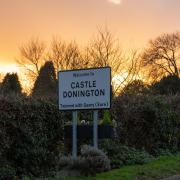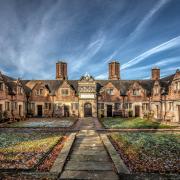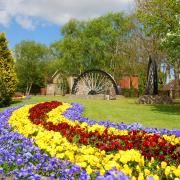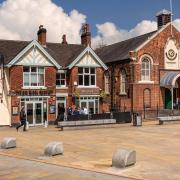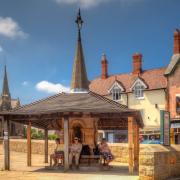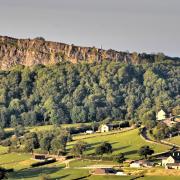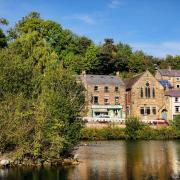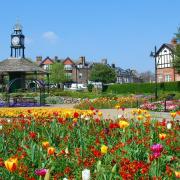A lifetime’s passion for stone walling has taken her across the globe, yet for Glossop’s Sally Hodgson, there really is no place like home.

Dry stone waller Sally Hodgson prefers to let her building skills do the talking. A master craftsman, she’s well equipped to teach the uninitiated that ‘creating the perfect batter’ has nothing to do with breaking eggs and that ‘a running joint’ is not to be confused with a medical condition.
In a conversation only lightly peppered with jargon typical of this heritage trade, it’s the foundations of an ongoing journey of discovery that is revealed by the spadeful; one which has led from the family farm in the High Peak to the other side of the world, and back again. In that time, Sally has become one of Britain’s highest qualified professional female dry stone wallers as well as a passionate environmentalist.
‘I thought I’d hit the jackpot,’ says Sally as she recalls, as a ten-year-old, discovering that she and her two older siblings had been swept up in their parents’ rural dream of buying and rebuilding a 74-acre derelict farm near Glossop.
‘My dad, a civil engineer for the local council, was ahead of his time,’ explains Sally. ‘He didn’t want to use fertilisers and chemicals and I inherited his love of nature and trying to balance farming with the needs of wildlife.

‘My mum was a trained chemist who practised homeopathy on both us and on the farm’s cows and sheep.’
More likely to receive a pitchfork than curling tongs in her Christmas stocking, as a youngster Sally embraced the challenges of their new lifestyle.
‘When I was growing up nobody had any money to bring in contractors. Ruben Cook, who used to live on our farm in the 1950s, came up to help repair the gaps in the stone walls and we three children were sent into the fields to help - or maybe hinder - him. He was a lovely man who became like a grandad to us.
‘I’d write birthday cards for Ruben to send because he couldn’t read or write yet could make anything without the need for machinery, and this instilled in all of us a love of building things - my brother later became a farmer and my sister, like me, is now a stone waller.’

More surprisingly, someone else who helped shape Sally’s future was renowned fashion designer Zandra Rhodes after ‘Little-un’, as Zandra referred to her, had joined the London-based studio - and the capital’s punk rock scene - whilst taking a degree in fine art and textiles.
‘I got on great with her’, says Sally. ‘Zandra is a huge character, a real workaholic, and was very familiar with the Peak District, having been hiking up here with her close friend Janet Street-Porter.’
Inspired to spread her wings further Sally, along with sister Jo, saved up for a single flight to Moscow, taking the Trans-Siberian railway to China, before arriving in Australia. A part-time weaver and part-time farmhand, three years on, the emigration papers were ready. Then, she says, her dad was diagnosed with cancer. Everything changed.
‘Returning home, I had no money and no job. My mum needed help on the farm but with work demands varying from week to week, I answered an advert in the Farmers’ Guardian for dry stone wallers on 5,000 acres of land owned by the father of Chris Crowther, of Moors for the Future. That’s a lot of wall with a lot of gaps.
‘Working on our own farm, I’d never thought of it as a job. We’d maintain uplands and habitats for the ground nesting birds like curlew, lapwing and snipe as part of the Peak Birds Project. And, thanks to my dad, achieved the high level stewardship standards held to this day.’
Having taken over the running of Higher Plainsteads Farm in the early 1990s, after her father passed away, Sally’s stone story grew from ‘gapping’ – repairing gaps where the wall has collapsed – to total rebuilds extending many metres in length.
Garden projects soon followed, including sunken gardens, hot tubs, follies and seats which, depending on the size of the site, might in the early days see her as the only woman working among perhaps 50 men. However what’s important, she says, is to be ‘recognised as a good waller and not because I’m a woman’.
‘Back in 1994 I met an engineer and, having worked on a reed bed together, he then commissioned several dry stone buildings – including a circular building hidden within a wall with a secret passageway. We’d no technical drawings, just ideas that we made work. Some of these needed huge pieces of stone to be moved around using slings, so I learned to operate a lot of different machinery. It’s miles away from standing in a field building a straightforward wall.
‘Depending on where and what the project is, I build with all sorts of different stone. Here in Derbyshire we’ve got both gritstone and limestone and, as a craftsperson and teacher, you need to know both as they offer different challenges. The gritstone, for example, is more level and therefore more difficult to build with.
Her barely concealed competitive streak would ultimately culminate in Sally joining the elite of the drystone walling world as a master craftsman, in 2009.
‘It was hard work but I was thrilled because it’s such an achievement,’ says Sally.
‘The Dry Stone Walling Association assess you - there’s a practical exam to take down and rebuild five square metres of wall, with a feature, within seven hours. I’d taken part in walling competitions during the early part of my career, so this helped as you get used to working fast under pressure.’
Another accomplishment was in becoming the industry’s first female examiner. And through the training arm of Walls for the Future, a company she formed with other working wallers, she now runs courses around the county including at Derbyshire Eco Centre, in Wirksworth. Additionally, Sally teaches at the neighbouring National Stone Centre.
Despite admitting to getting bored quickly, over three decades on, working with stone continues to fire Sally’s imagination.
‘You never stop learning. Every stone you pick up is different and every job is different. One minute you might get an enquiry for a job that’s a morning’s work. The next one might last for three years.
‘I used to really enjoy the challenge of the building sites, and very difficult and challenging projects, but during the past four years I’ve returned to field walling and just want to be on my own in the middle of a field. It’s complete mindfulness.’
These therapeutic benefits have been shared with others as part of Derbyshire County Council’s Bright Side Project. She’s also, thanks to the Winston Churchill Memorial Trust’s fellowship scheme, been lucky enough to travel to both India and Norway to research the construction of dry stone buildings. For now, though, Sally’s focus is back on the family farm.
‘At the height of the covid-19 pandemic we were busy in the lambing shed. It’s a complete bubble but a great one.
‘People sometimes ask me how much of our own farm walls I’ve helped conserve over the years – it’s easily 60%. I will never stop walling.’






